Thursday May-22 2025 10:51:26
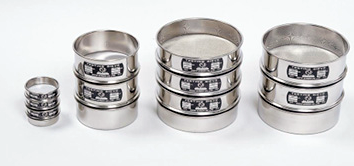
Stainless steel pollen laboratory test sieves are precision tools specifically used for pollen separation, grading and purity testing. As the reproductive cell of plants, pollen has a particle size, morphology and density that varies from plant species to plant species and is usually very small (for example, many wind-pollinated pollen particles are around 30-50 microns in size), and is lightweight and easy to disperse. Therefore, fine separation and analysis of pollen requires high-precision screening equipment.Stainless steel test sieves are ideal for pollen laboratory testing because of their stable material, corrosion resistance, easy cleaning and precise aperture. The sieving mesh of the test sieve is its key parameter, which determines the size of the sieve hole. For example, a sieve with a mesh of 40, 50 or even higher mesh can effectively screen out pollen of different particle size ranges.
In pollen laboratory test sieves, the main difference between 304 and 316 stainless steel is their chemical composition and the resulting corrosion resistance. These differences determine the environment and cost for which they are respectively applicable.
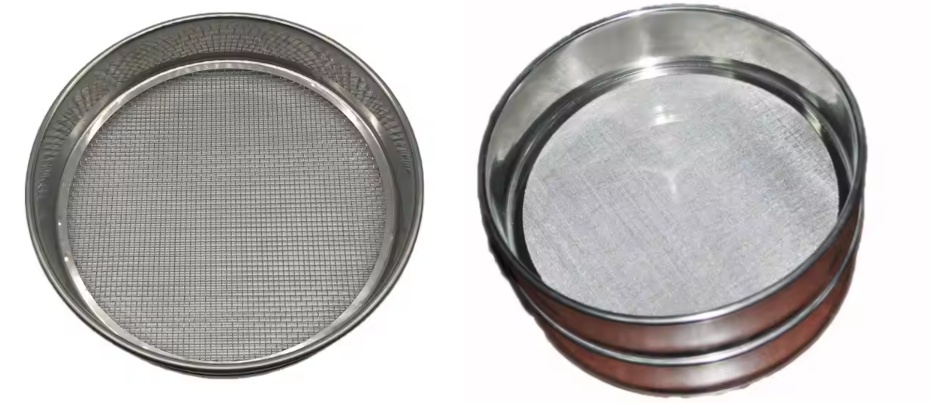
304 stainless steel: Mainly composed of 18% chromium and 8% nickel (commonly known as 18/8 stainless steel).
316 stainless steel: Based on 304 stainless steel, about 2-3% of molybdenum is added. In addition, 316 stainless steel usually contains a higher nickel content (10-14%).
|
Dimensions |
304 stainless steel |
316 stainless steel |
|
Strength and hardness |
Moderate strength, suitable for conventional screening pressure |
Slightly higher than 304, better vibration and impact resistance, suitable for mechanical vibration screening or high-frequency use scenarios |
|
High temperature resistance |
The maximum temperature resistance is about 800℃, suitable for normal temperature or low temperature screening |
The temperature resistance can reach 1200℃, if the experiment involves high-temperature drying of pollen samples, 316 is more suitable |
|
Cost |
low price, high cost performance |
cost is about 10%~20% higher than 304, suitable for high-end research with strict requirements on corrosion resistance. |
|
Typical scenarios |
ordinary pollen particle size analysis, screening experiment of non-corrosive reagents |
pharmaceutical-grade pollen purification, marine biological pollen research, screening under strong acid/strong alkali conditions |

The mesh number selection of stainless steel pollen laboratory test sieve needs to comprehensively consider pollen characteristics, experimental purpose and industry standards. The specific basis is as follows:
1. Pollen particle size distribution range
The particle sizes of pollen from different plants vary significantly (e.g., pine pollen is about 20-60 microns, dandelion pollen is about 30-40 microns), and the particle size range of the target pollen needs to be determined through preliminary experiments or literature data. For example:
If you need to separate coarse pollen particles (e.g., larger than 100 microns), you can choose a 20-40 mesh (aperture 0.84-0.42mm) sieve;
If you study fine pollen particles (e.g., less than 50 microns), you need a 100-300 mesh (aperture 0.15-0.053mm) or even higher mesh sieve.
2. Experimental accuracy requirements
Qualitative analysis (e.g., pollen morphology observation): You can use a lower mesh (e.g., 20-60 mesh) for rapid screening to obtain samples in the main particle size range;
Quantitative research (e.g., allergen content determination): You need to select a high-precision mesh according to the pollen particle size corresponding to the target component. For example, for allergenic pollen below 20 microns, you need to use a 270 mesh. 0.053mm or 400 mesh (0.037mm) sieves for precise grading.
3. Sieve material and tolerance
The higher the mesh number of the stainless steel sieve, the finer the mesh wire, and its anti-clogging ability when screening sticky pollen (such as oily pollen) needs to be evaluated. For example, when screening pollen that is easy to agglomerate, 60-100 mesh (0.25-0.15mm) can be preferred and combined with vibration screening to avoid high mesh sieve clogging affecting experimental efficiency.
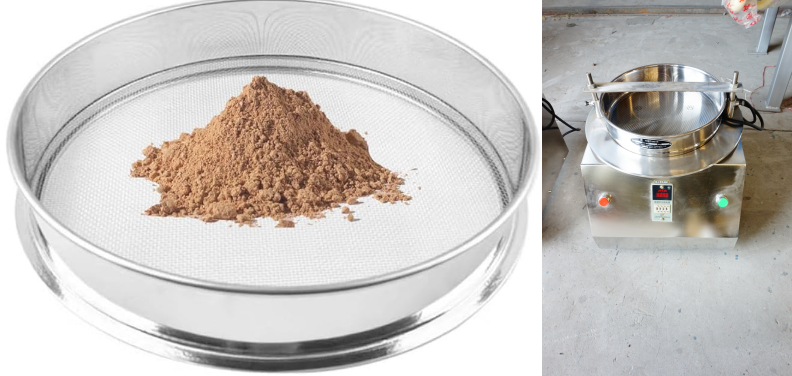
|
Type/Use |
Mesh size (micrometer, µm) |
pore size (micrometer) |
remarks |
|
Woven wire mesh |
10 |
2000 |
Extremely fine screening, used for high-precision separation or removal of tiny impurities |
|
25 |
707 |
Commonly used for screening fine pollen particles |
|
|
30 |
595 |
|
|
|
45 |
420 |
|
|
|
50 |
354 |
|
|
|
Stainless steel mesh |
80 |
177 |
Commonly used in pollen particle size distribution testing |
|
100 |
149 |
|
|
|
150 |
105 |
|
|
|
200 |
74 |
|
|
|
Woven wire mesh |
100 |
297 |
Used for testing medium-sized pollen particles |
|
200 |
250 |
Used for larger pollen particles or removing coarse impurities |
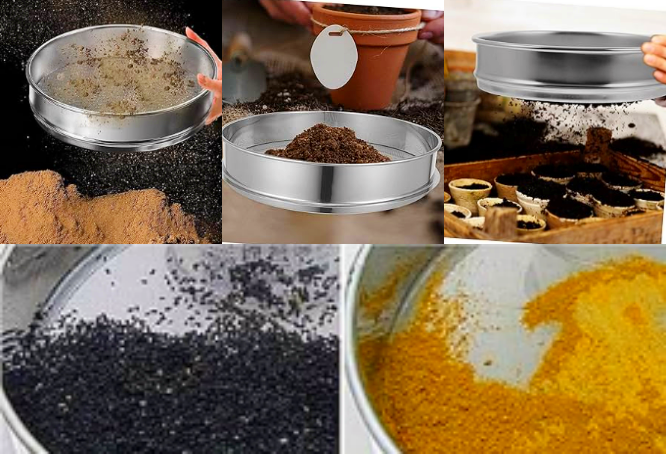
Stainless steel pollen laboratory test sieves play an indispensable role in pollen research and application. Their application scenarios are far more than simple filtration, but go deep into multiple core areas such as pollen quality control, component separation, particle size analysis, and allergen research.
In the production of pollen products, whether it is used for food, health products or cosmetics, test sieves are key tools to ensure product purity and quality. For example, when producing bee pollen tablets or capsules, impurities need to be removed through sieves of different micron sizes. The test sieve can effectively remove pollen from other plants or other plant impurities, such as bee limb fragments, plant residues or larger particles, and accurately separate the pollen particle size range that meets the product requirements, which directly affects the taste, absorption efficiency and stability of the product. For the extraction and purification of single pollen, such as rapeseed pollen, camellia pollen, etc., the test sieve can effectively remove foreign pollen or other plant impurities to ensure the purity of the target pollen, which is crucial for scientific research experiments and the production of high-value products.
The accuracy of the stainless steel pollen laboratory test sieve is mainly reflected in the uniformity and stability of the mesh aperture, which directly affects the accuracy of pollen screening. High quality The stainless steel screen adopts high-precision weaving technology, and the aperture size is strictly controlled, usually with an error of about ±5%, which ensures the effective separation of pollen of different particle sizes during the screening process. Because the screen is woven from metal wire, its aperture is not easily deformed due to cleaning or long-term use, and maintains a high degree of repeated use stability.
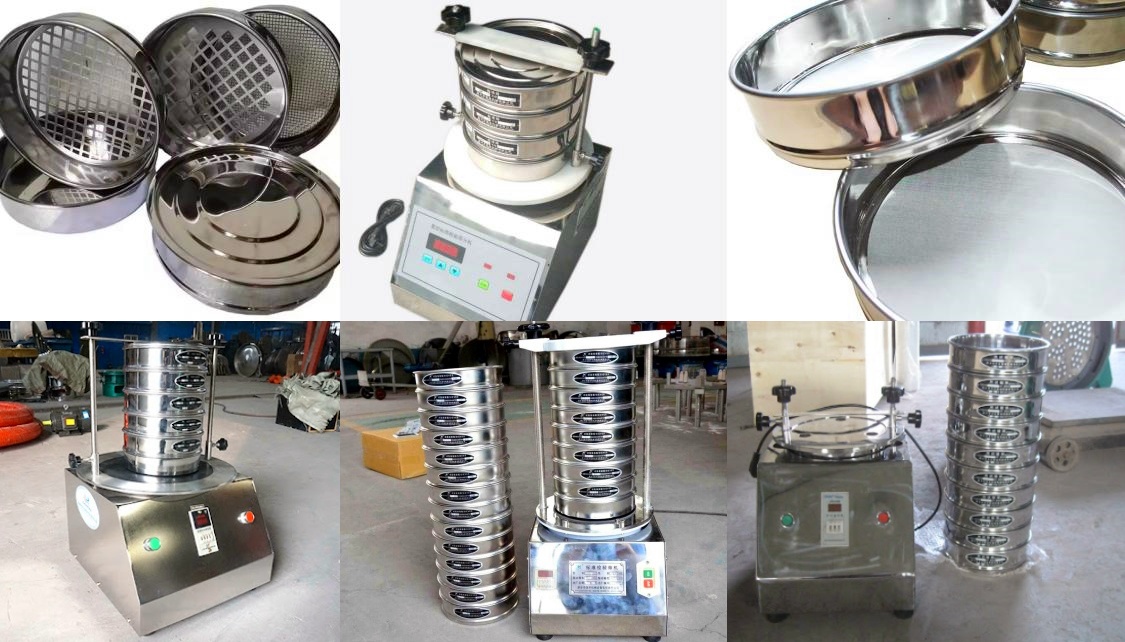
In short, the stainless steel pollen laboratory test sieve, with its precise aperture and corrosion resistance, provides a standardized and refined separation and analysis method for the entire process of pollen from the field to the laboratory and then to the final product application, and is an important cornerstone for enhancing the depth of pollen research and the breadth of application.
What is the wet sieving process?
Wet sieving process is a sieving process assisted by a liquid (usually water or a solution containing a dispersant) to more effectively...
Fines content tester can be defined as an instrument used to quantitatively determine the content of fines powder components of a specific fineness...
Micro silica powder particle size analysis test sieve
Micro silica powder, also known as silica fume, is an ultrafine active silica material with a very small particle size, usually between 0.1-0.3 microns, which...
Agricultural gruesos Test sieves
Agricultural gruesos test sieves are experimental equipment used for particle size analysis, grading and testing of agricultural soil, gruesos...
Stainless steel frame and woven cloth
The test sieve is a laboratory equipment used for particle size analysis. Its core components usually include a stainless steel frame and woven cloth (also called a sieve)...
Laboratory test sieve used for fertilizer particle screening
Laboratory test sieve is a precision screening equipment used for grading and testing fertilizer particles and other materials, suitable for multiple industries such as chemical...
May 22, 2025
stainless steel pollen laboratory test sieve
Stainless steel pollen laboratory test sieve is a precision tool for pollen separation, classificatio...
May 21, 2025
The low-priced coffee test sieve is a key tool for evaluating the particle size distribution of coffe...
May 20, 2025
Laboratory test sieve used for fertilizer particle screening
Laboratory test sieve is a precision screening equipment widely used for detecting the particle size ...
May 19, 2025
Lab Sieve Analysis Equipment for Calcium Carbonate
lab sieve equipment for calcium carbonate is a key instrument for accurately analyzing and grading th...
![]()
Then we look forward to hearing from you
Contact Us
Industrials
Yanjin county forest park gate to the west 1000 meters north road sitemap
